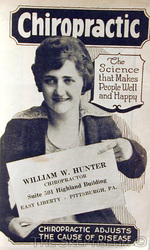Cold season is still around, so instead of reaching for an over-the-counter medication, which will impair your body's ability to heal itself, do the following and help your body take care of itself: Did you know that it’s a myth that cold weather causes colds? Viruses — coupled with a lowered immune response — cause colds. Certain bacteria may also spawn infections that produce cold-like symptoms.
Vulnerable to Infection However, cold weather isn’t completely off the hook. Most cold-causing viruses survive better with low humidity, which occurs most often during winter months. Also, cold temperatures can dry nasal membranes, making them more vulnerable to infection. But, just because the temperature has dropped, doesn’t mean that you’re doomed to get sick. Dr. Masoud has developed a list of all-natural ways to help you ward off the common cold and shorten its duration. Commit to Chiropractic Care The chiropractic lifestyle protects and builds the immune system, which is fundamental to ward off colds. The foundation of this lifestyle centers on making choices that focus on preventative health from adequate nutrition and sleep to regular chiropractic visits. Why is chiropractic care vital to the immune system? The spinal cord contains a multitude of nerves that emerge between spinal bones or vertebrae. Vertebrae often become misaligned, restricting spinal movement and affecting adjacent nerves — a condition called vertebral subluxation. Preliminary research shows that vertebral subluxations weaken the immune system. The good news is that through a series of gentle and safe maneuvers, called chiropractic adjustments, Dr. Shamaeizadeh corrects vertebral subluxations. Chiropractic care may have a beneficial effect on immune function when misaligned vertebrae are corrected. For instance, one study found that levels of white-blood cells, which are associated with immune function, were “significantly higher” following chiropractic adjustments (J Manipulative Physio Therapy 1991;14:399-408). Embrace Exercise With the symptoms of a common cold runny nose, sore throat, a cough, watery eyes, sneezing and miserable congestion — staying active probably is the last thing on your mind. However, a small amount of gentle exercise may be helpful for body and mind. A short walk, unless you feel dizzy or have a fever, may do wonders to make you feel better and help to loosen built-up mucus and fluids. Of course, you don’t want to overdo it: Running a marathon while you’re under the weather probably isn’t the best idea, but some daily exercise like a short brisk walk will help strengthen the immune system. Exercise also produces feel-good hormones. These hormones fight off the blues that often go hand-in-hand with colds and winter. Stop Stress Study after study proves that emotional stress weakens the immune system and the body’s natural cold- fighting abilities. So, when you feel the sniffles coming on, work to reduce stress. It’s true that stress is practically unavoidable; however, we can control how we respond to a particular event, behavior, place or person. Begin by determining your major stressors and eliminating as many as possible. Don’t be afraid to say “no” when you’re approaching your limits — It’s impossible to do it all. Daily exercise and a diet packed with fresh fruits, vegetables, grains, healthy fats and lacking in caffeine and other stimulants can immensely help with stress management. Savor Sleep Sleep is essential to rejuvenate the body and mind. Lack of sleep affects health, concentration, memory, decision-making abilities, energy, enthusiasm and mood. If that isn’t enough, inadequate sleep severely inhibits the body’s natural ability to ward off colds. If you begin to feel rundown, make a point of getting at least seven to eight hours of sleep each night. When you have a cold, you may require even more zzzz’s. Have Some Hot Peppers For many cold sufferers, sinus congestion is their most detested symptom. Many medications that temporarily thin lung and nasal secretions are loaded with unhealthful ingredients, such as high-fructose corn syrup, coloring and flavors. Certain ingredients can also have side effects, such as intestinal pain and excitability. Loosening lung and sinus congestion with spicy food — notably hot peppers — is an all-natural way to thin and expectorate bronchial secretions. And, unlike drug expectorants, hot peppers have immune-boosting vitamins, such as A, C and E. They are also rich in potassium and folic acid. Get Some Green Tea Green tea’s history dates back to China approximately 5,000 years ago. A native of Southeast Asia, some green-tea plants have towered up to a record 40 feet in height. Yet this powerful goliath is not only a giant in stature, it’s also a health marvel. Research shows that sipping green tea has spectacular health benefits from reducing allergies and killing cancer cells to speeding weight loss. In addition, green tea also amplifies antioxidant activity, decreases inflammation and — you guessed it — helps fight the common cold! Try adding natural honey to this emerald libation. Scientific studies show that honey boasts its own cold-fighting properties as well. Get Jazzed About Ginger Preliminary research shows that ginger may help fight germs associated with the common cold. Researchers collected throat swabs from more than 300 cold sufferers. They then isolated four respiratory tract pathogens in the swab specimens and treated them with ginger extract. The result? The ginger extract demonstrated antibacterial activity against all of the pathogens (East Afr Med J 2002;79:588-92). Check Out Vegetable Soup Not only is vegetable soup comforting when you’re under the weather, but research also shows that Grandma was right: Vegetable soup is an effective cold remedy! Investigators found that vegetable soup inhibits inflammation and upper respiratory infections. Homemade vegetable soup is the most beneficial: The study’s authors point out those commercial soups vary widely in their ability to help. Lower the salt in your homemade creation, but include all the fixings. Tasty ingredients, such as onions, sweet potatoes, parsnips, turnips, carrots, celery stems and parsley, also exhibit medicinal properties (Chest 2000;118:1150-7). And, don’t forget the garlic and a sprinkle of crushed cayenne pepper, both are bursting with disease-fighting chemicals. Choose the Right Vitamin Oriented vitamin regime includes a reputable ORGANIC multivitamin and mineral supplement with adequate levels of all components, including B-complex vitamins. In addition, consider taking a calcium and magnesium supplement and extra antioxidants like vitamin C, vitamin E or grape-seed extract. An omega-3 supplement free of heavy metals will also boost immune function. Talk to the doctor first about what specific supplement program is right for your individual needs. If you feel a cold coming on, your doctor of chiropractic may advise you to take extra antioxidant supplements. For instance, vitamin E may have protective anticold benefits according to researchers atTufts University, Boston, Mass. Scientists examined the effects of vitamin B supplementation on respiratory tract infections in 451 nursing-home patients, aged 65 or older. Participants either received 200 IU of vitamin E or a placebo capsule each day. Vitamin B participants had lower incidence of common colds than individuals receiving the placebo. The researchers concluded that there is a “protective effect of vitamin E supplementation on upper respiratory tract infections, particularly the common cold, that merits further investigation.” (JAMA 2004;292:828-36.) Remember to consult your chiropractor and other health care providers before taking any vitamin supplement or herbal remedy. Be sure to inform him or her of anything you’re taking to avoid counteracting any prescription or supplement.
0 Comments
Leave a Reply. |
New Patient SpecialArchives
July 2024
Categories |



 RSS Feed
RSS Feed
